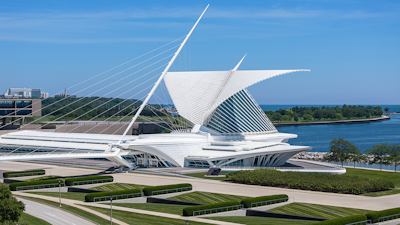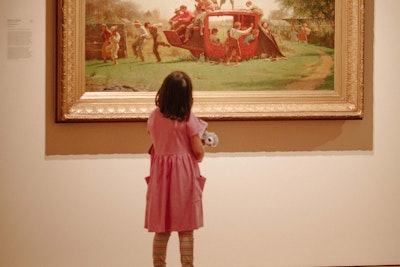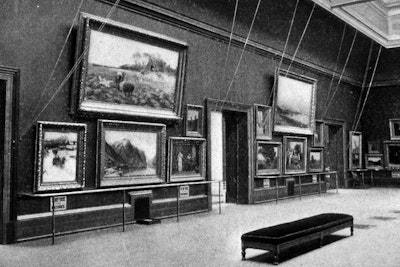Museum Info


Overview
The Milwaukee Art Museum connects people with art, each other, and the world. From its roots in Milwaukee’s first art gallery in 1888, the Museum has grown to be Wisconsin’s largest art institution. Located on a 24-acre lakeside campus in downtown Milwaukee, it is a vital cultural resource and icon for the city.
More than 34,000 artworks from antiquity to today comprise the Museum’s expansive collection. American and European painting, sculpture, and decorative arts; conceptual and minimalist art; prints and drawings; photography and new media; modern and contemporary design; folk and self-taught art; and 20th-century Haitian art count among its strengths. Housed in buildings designed by architects Santiago Calatrava (2001), David Kahler (1975), and Eero Saarinen (1957), the Museum is an essential destination for both art and architecture.
At the center of every Milwaukee Art Museum experience is a driving mission to share extraordinary works of art, reveal their compelling stories, and create meaningful experiences that grow and inspire our community.


Learn about Museum’s iconic buildings and the legendary architects who designed them
Learn moreGovernance
Senior Leadership Team
Donna and Donald Baumgartner Director: Meet Dr. Kim Sajet
Chief Operations and Financial Officer: Alissa Karl
Chief of Curatorial Affairs: Liz Siegel
Chief Development Officer: André Allaire
Barbara Brown Lee Chief Learning & Engagement Officer: Amy Kirschke
Senior Director of Community Dialogue & Adult Programs: Kantara Souffrant
Chief People Officer: Linda Woods
Chief of Staff: Natalie Boten
Chief Experience Officer: Scott Schwebel
Officers + Board of Trustees
Officers
Chair: Andrew Nunemaker
Immediate Past Chair: Jeffery Yabuki
Secretary: Joan Lubar
Treasurer: Rosanne Kropp
Trustees at Large
Christopher S. Abele, Laura Arnow, Deborah Attanasio, Daniel J. Bader, Donna Baumgartner, Wendy Blumenthal, Danielle Brinkman, Richard Buchband, Wendy Burke, Joseph W. Checota, Mauree Childress, Peter Damsgaard, Alexander P. Fraser, Joseph P. Gromacki, William R. Haack, Joshua J. Jeffers, Brian Kennedy, Thomas Lacy, Wayne R. Lueders, Jill G. Pelisek, Joel Quadracci, Sande Robinson, Shawn Rolland, Suzanne Selig, Mary M. Strohmaier, Symphony D. Swan-Zawadi, Christine Symchych, John Utz, Daniel P. Wilhelms, Sarah Zimmerman
Life Trustees
Donald Baumgartner, Betty Ewens Quadracci*, Marianne Lubar, Sheldon B. Lubar
*deceased
Strategic Direction
The Milwaukee Art Museum has always collected art for and shared art with the people of Milwaukee. Over the next phase of the Museum’s life, we will take bold steps to further extend our welcome mat, presenting art in a way that allows all individuals to see themselves and their lives in the Museum and to experience the transformative benefits of art.
To accomplish this vision for the future, the Museum will leverage its history, build on its strengths, and implement the following strategic pillars:
- Art Relevant to Our Community
- Robust Community Programming
- Expansive Hospitality
- Impact Aligned with Financial Strength and Discipline
Download our letter from leadership.

Explore the Museum’s mission and future vision
Continue reading (opens in new window)Financial reports
Annual reports
2024 | 2023 | 2022 | 2021 | 2020 | 2019 | 2018 | 2017 | 2016 | 2015 | 2014 | 2013 | 2012 | 2011 | 2010 | 2009 |2008 | 2007 | 2006 | 2005 | 2004 | 2003
Audited financial statements
2020/2021 | 2019/2020 | 2018/2019 | 2017/2018 | 2016/2017 | 2015/2016 | 2014/2015 | 2013/2014 | 2012/2013 | 2011/2012 | 2010/2011 | 2009/2010 | 2008/2009 | 2007/2008 | 2006/2007 | 2005/2006 | 2004/2005 | 2003/2004
Form 990
2017/2018 |2015/2016 | 2014/2015 | 2013/2014 | 2012/2013 | 2011/2012 | 2010/2011 | 2009/2010 | 2008/2009 | 2007/2008 Part 2 | 2007/2008 Part 1 | 2006/2007 | 2005/2006


